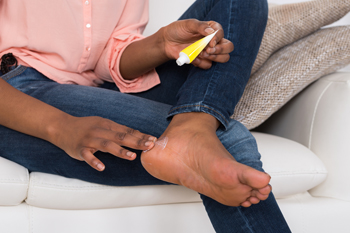The skin of the heels is naturally drier than skin of other parts of your body. Sometimes the heels can become so dry that they crack. This is especially common in the winter months when the cool, dry air may void the skin of moisture. Certain factors, such as obesity, wearing backless shoes, and standing for prolonged periods of time, can make your heels more prone to cracking. Caring for your dry or cracked heels at home may improve their condition. You can care for your heels by soaking them in warm water, exfoliating them with a pumice stone or loofah, and applying a thick moisturizer. For some people, cracks on the heels can become deep, painful fissures. If you have fissures or if your cracked heels are persistent and uncomfortable, it is suggested that you see a podiatrist for treatment.
If the skin on your feet starts to crack, you may want to see a podiatrist to find treatment. If you have any concerns, contact one of our podiatrists from New England Foot and Ankle. Our doctors can provide the care you need to keep you pain-free and on your feet.
Cracked Heels
It is important to moisturize your cracked heels in order to prevent pain, bleeding, and infection. The reason cracked heels form is because the skin on the foot is too dry to support the immense pressure placed on them. When the foot expands, the dry skin on the foot begins to split.
Ways to Help Heal Them
- Invest in a good foot cream
- Try Using Petroleum Jelly
- Ease up on Soaps
- Drink Plenty of Water
Ways to Prevent Cracked Heels
- Moisturize After Showering
- Skip a Shower
- Keep Shower Water Lukewarm
- Don’t Scrub Your Feet
If you are unsure how to proceed in treating cracked heels, seek guidance from a podiatrist. Your doctor will help you with any questions or information you may need.
If you have any questions, please feel free to contact one of our offices located in Chelmsford and Newburyport, MA . We offer the newest diagnostic and treatment technologies for all your foot care needs.
Read more about Solutions for Cracked Heels
